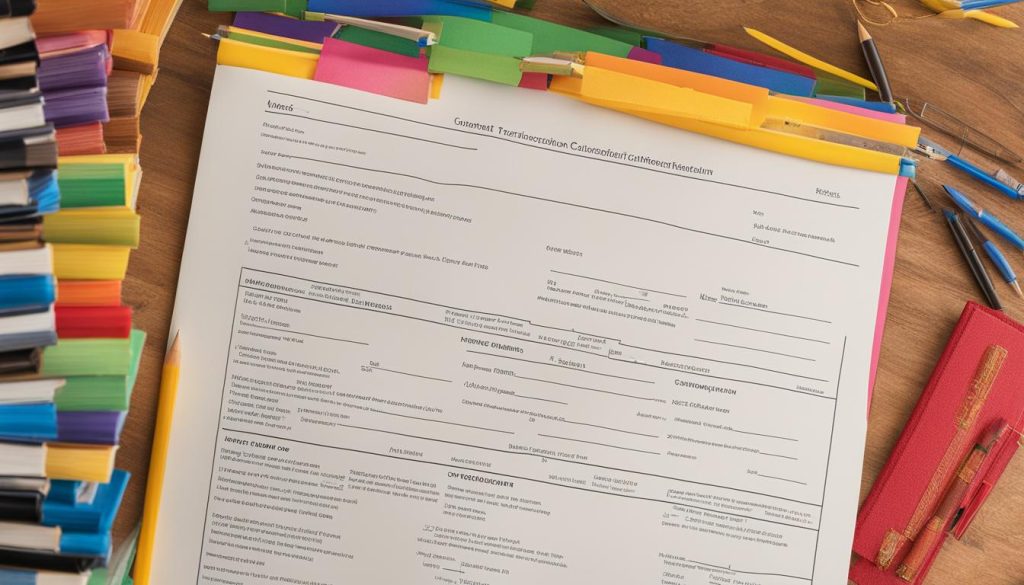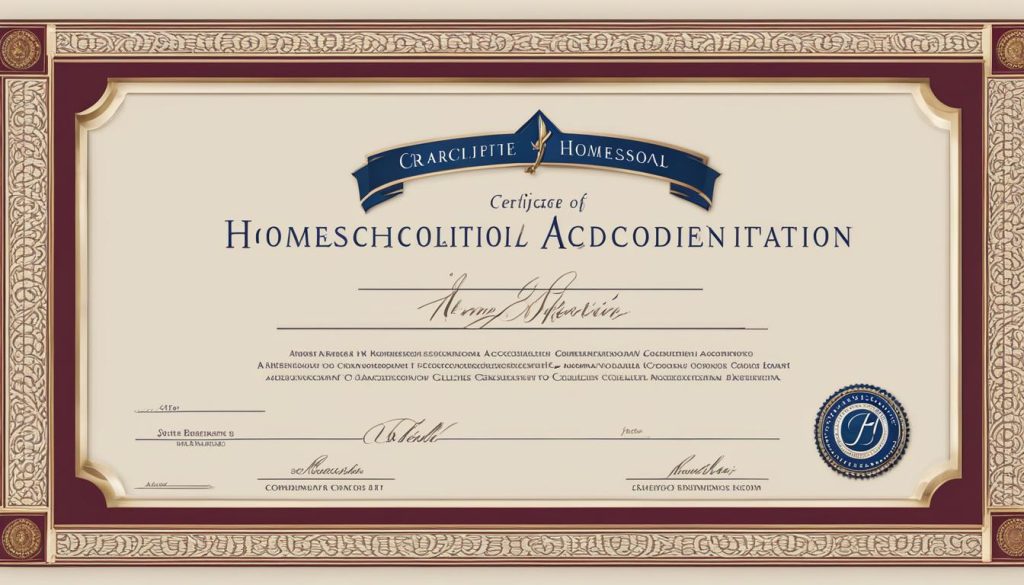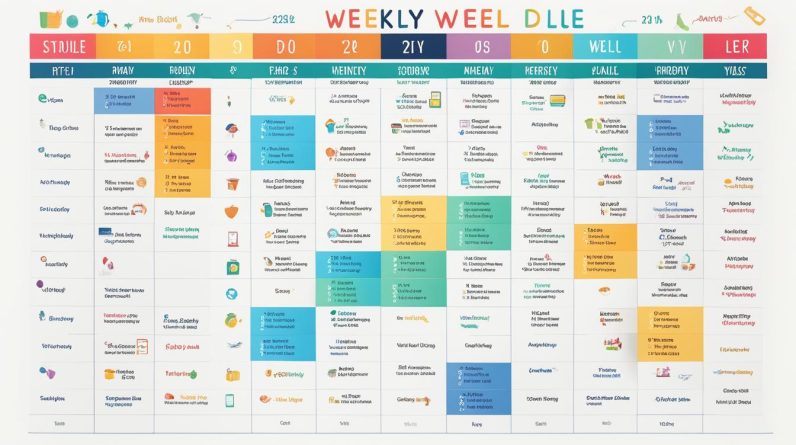Welcome to HomeschoolDiploma.com, your go-to resource for obtaining accredited home school diplomas online. We understand the importance of a high school diploma in your child’s educational journey and aim to provide you with the tools and information you need to confidently navigate the process. Whether you are a seasoned homeschooling parent or new to the world of homeschooling, we are here to support you every step of the way.
Obtaining a homeschool high school diploma is a straightforward process, and we’re here to simplify it for you. You don’t need to jump through hoops or meet strict requirements. Ordering a personalized home school diploma from HomeschoolDiploma.com is all it takes. With our wide range of custom options, you can create a unique and affordable diploma that celebrates your student’s achievements.
In this article, we will provide you with essential information on homeschool diplomas, the difference between a diploma and a transcript, how to obtain a diploma, who can issue a diploma, the importance of transcripts, state requirements, and much more. We will also address how homeschool diplomas are viewed by colleges and discuss alternatives to homeschool diplomas and accreditation.
So let’s dive in and discover how you can earn your homeschool diploma confidently!
Key Takeaways:
- Earning a homeschool diploma is a straightforward process that involves ordering an accredited diploma online.
- A homeschool diploma is a certificate that represents your student’s completion of high school requirements.
- Transcripts are an official record of a student’s courses and grades and are important for college admission and other purposes.
- As a homeschool parent, you have the authority to issue a diploma for your student as long as you follow your state’s homeschool laws.
- Creating a comprehensive transcript is crucial for college admission and other future endeavors.
Understanding the Difference between Diploma and Transcript
A diploma and a transcript are both important documents in a student’s academic journey. However, they serve different purposes and hold distinct meanings. Let’s explore the differences between these two essential components of high school education.
A diploma is a certificate awarded by an educational establishment, such as a homeschool program, to signify the successful completion of a course of study. It serves as a symbol of accomplishment and can be proudly displayed as proof of graduation. Homeschool graduation certificates are a great way to celebrate the years of dedication and hard work put into a high school education.
A transcript, on the other hand, is an official record of a student’s academic performance. It lists the courses taken, grades achieved, and credits earned throughout the high school years. Transcripts provide a comprehensive overview of the student’s academic journey and serve as a crucial document for college admissions.
Colleges and universities typically require transcripts as part of the application process. They use transcripts to evaluate a student’s academic preparedness and determine if they meet the necessary prerequisites for admission. Transcripts provide colleges with valuable information about the courses a student has taken and the grades they have earned.
The key distinction between a diploma and a transcript lies in their purpose. While diplomas symbolize the completion of high school and are cherished mementos, transcripts offer a detailed academic record that showcases a student’s abilities.
It’s important to remember that while diplomas hold sentimental value and reflect the effort put into high school, transcripts are the primary document colleges want to see when your child applies for admission.
Now that we understand the difference between a diploma and a transcript, let’s dive deeper into how homeschoolers can obtain their high school diplomas in the next section.
How to Obtain a Homeschool High School Diploma
To obtain a homeschool high school diploma, all you need to do is order one. An online option like HomeschoolDiploma.com offers a wide range of custom options to make the diploma special. They even offer hand calligraphy and allow you to choose from various colors, add your school logo, and select different types of paper. Ordering from a homeschool family business can also be a great way to support the community.
When it comes to personalized home school diplomas, HomeschoolDiploma.com has you covered. Their user-friendly website allows you to easily customize your diploma to reflect your student’s achievements. Whether you want to include their name, graduation date, or your own school logo, the possibilities are endless. Plus, with affordable home school diplomas, you can celebrate your student’s academic success without breaking the bank.
With HomeschoolDiploma.com, you can trust that your personalized home school diploma will be of the highest quality. Their attention to detail and commitment to customer satisfaction ensure that you receive a diploma that you and your student can be proud of. Don’t settle for a generic diploma when you can create a one-of-a-kind keepsake that truly represents your student’s homeschool journey.
Ordering a homeschool high school diploma is simple and convenient. Just visit HomeschoolDiploma.com, choose your preferred design options, and place your order. In no time, you’ll have a personalized diploma in hand, ready to commemorate your student’s accomplishments. Whether you plan to display it proudly on the wall or keep it as a cherished memento, a personalized home school diploma is a tangible symbol of your student’s hard work and dedication.
So why wait? Visit HomeschoolDiploma.com today and order your affordable home school diploma. Embrace the opportunity to create a customized diploma that truly captures your student’s unique homeschool experience. Celebrate their achievements and provide them with a lasting reminder of their educational journey.
“A personalized home school diploma is a wonderful way to showcase your student’s accomplishments and celebrate their academic success. HomeschoolDiploma.com offers a wide range of custom options, allowing you to create a diploma that is truly unique. With their affordable prices and attention to detail, you can trust that you’ll receive a high-quality diploma that reflects your student’s hard work and dedication.”
Who Can Issue a Homeschool High School Diploma?
As a homeschool mom, you have the authority to decide if your teen has completed the required courses to graduate. You don’t need anyone else to validate your child’s diploma.
As long as you have followed your state’s homeschool laws, you can confidently issue a diploma for your student. Don’t worry, the process is straightforward and legitimate.
“As a homeschool mom, you play a crucial role in your child’s education. You have the power to acknowledge their hard work and issue a recognized home school diploma.”
Understanding Your Role as a Homeschool Mom
Recognized home school diplomas can be issued by the parent or guardian responsible for homeschooling. You have put in the time, effort, and dedication to ensure your child receives a quality education.
Reputable home school diplomas come from legitimate sources, and as a homeschooling parent, you have the authority to issue one for your student. Don’t underestimate the value of this achievement.
Why Homeschool Diplomas Are Accepted
Homeschool diplomas are widely accepted by many colleges and universities. Institutions understand that every homeschooling experience is unique and appreciate the flexibility and personalized approach it offers.
Colleges and universities recognize the effort and academic standards homeschooling parents uphold. They value homeschooled graduates for their adaptability, strong work ethic, and ability to think independently.
Understanding the Importance of Transcripts
While a high school diploma holds significance, when it comes to college admission and other applications, a homeschool transcript is a vital document. It provides a comprehensive overview of the courses completed and grades achieved by your homeschooled student. Transcripts are frequently requested by colleges, employers, trade schools, and scholarship committees, acting as tangible evidence of a student’s educational achievements.
Keeping track of grades and courses throughout high school is essential to create an accurate homeschool transcript. It not only showcases the academic growth and progress of your student but also demonstrates their commitment to their education and future endeavors. An impressive transcript adds credibility and highlights the depth and breadth of their educational journey.
Benefits of a Comprehensive Transcript
- Validates the academic achievement: A well-documented transcript strengthens your homeschool program and demonstrates the rigorous education provided to your student.
- Supports college admission: Colleges and universities rely on transcripts to assess an applicant’s academic performance and determine their eligibility for admission.
- Facilitates transfer credits: If your student plans to transfer to another educational institution, a transcript acts as a roadmap for evaluating which credits can be transferred.
- Enhances scholarship opportunities: Transcripts often play a crucial role in securing scholarships, as they provide a comprehensive view of a student’s accomplishments and potential for success.
- Facilitates career opportunities: Employers and trade schools may request transcripts to evaluate an applicant’s academic background and determine their suitability for specific positions or programs.
By meticulously documenting grades, coursework, extracurricular activities, and any other relevant academic accomplishments, you can create a compelling homeschool transcript that showcases the unique strengths and achievements of your homeschooled student.
Remember, a well-prepared transcript not only reflects your student’s academic prowess but also demonstrates their commitment to learning and their potential for future success.

| Components of a Homeschool Transcript | Description |
|---|---|
| Student Information | Includes the student’s name, identification number (if applicable), and the name of your homeschool. |
| Grading Scale | Indicates the grading system used, such as letter grades, percentages, or a 4.0 scale. This helps colleges and universities evaluate the student’s academic performance. |
| Courses and Credits | List of all courses completed, including core subjects and electives, along with the credits assigned to each course. This provides a comprehensive overview of the student’s educational background. |
| GPA | The overall Grade Point Average (GPA) shows the student’s average performance across all courses. It helps colleges and universities assess the student’s academic capabilities. |
| Extracurricular Activities | Record any notable extracurricular activities, clubs, community service, or leadership roles. These activities demonstrate a well-rounded education and highlight the student’s interests and achievements beyond academics. |
| Graduation Date | Includes the expected or actual graduation date of the student. This serves as a reference for colleges, employers, and other institutions. |
State Requirements and Flexibility in Creating Graduation Requirements
When homeschooling your child, it’s important to understand the homeschool graduation requirements set by each state. These requirements outline the specific guidelines that you need to follow to ensure that your child’s education meets the necessary standards. While some states have strict graduation requirements for homeschoolers, others offer more flexibility and allow you to tailor the curriculum to your child’s unique needs and interests.
Check the homeschool laws and regulations in your state to determine what courses and credits are necessary for graduation. Some common subjects that may be required include English, Math, Science, Social Studies, and Foreign Language. However, the specific requirements may vary depending on the state.
Once you have a clear understanding of the state requirements, you have the freedom to create your own graduation requirements based on your child’s abilities, interests, and future career goals. This flexibility in designing the curriculum allows you to personalize your child’s education, ensuring that they receive a well-rounded and comprehensive learning experience.
Remember, homeschooling provides a unique opportunity to tailor your child’s education specifically to their needs and interests. Take advantage of this flexibility and create a graduation plan that sets them up for success in their chosen path.
Whether you decide to follow the state requirements closely or create your own, it’s essential to keep track of your child’s progress and document their accomplishments. This documentation will serve as a record of their education and can be presented if needed for college applications, scholarships, or future career opportunities.
Homeschool Graduation Requirements by State
| State | Graduation Requirements |
|---|---|
| California | 4 years of English, 3 years of Math, 2 years of Science, 3 years of Social Studies, 1 year of Fine Arts, 2 years of Physical Education |
| Texas | 4 years of English, 4 years of Math, 4 years of Science, 4 years of Social Studies, 1 year of Fine Arts, 2 years of Physical Education |
| Florida | 4 years of English, 4 years of Math, 3 years of Science, 3 years of Social Studies, 1 year of Fine Arts, 1 year of Physical Education |
| New York | 4 years of English, 3 years of Math, 3 years of Science, 4 years of Social Studies, 1 year of Fine Arts, 2 years of Physical Education |
| Colorado | 4 years of English, 3 years of Math, 3 years of Science, 3 years of Social Studies, 1 year of Fine Arts, 2 years of Physical Education |
Remember to research and understand the homeschool graduation requirements specific to your state to ensure compliance and plan your child’s educational journey accordingly.

Homeschool Diplomas and College Admission
When it comes to college admission, homeschool diplomas hold significant value. In fact, most colleges and universities recognize homeschool diplomas as valid proof of high school graduation. This recognition highlights the credibility and effectiveness of homeschool education.
However, it’s important to note that some institutions may require additional documentation to validate the diploma. To ensure a smooth transition into college, it is essential to thoroughly research the admission requirements of the colleges your student is interested in, as well as any scholarship opportunities they may be eligible for.
It is worth mentioning that many colleges actively recruit homeschool graduates due to their unique approach to education. Homeschooling provides students with a personalized and well-rounded academic experience, fostering independent thinking and self-motivation. Colleges value these qualities and recognize the exceptional preparation homeschool graduates receive.
As you explore college options for your homeschooled student, consider reaching out to college admissions offices to inquire about their specific policies regarding homeschool diplomas. This proactive approach ensures that you have all the information necessary to set your student up for success.
“Homeschooling provides students with a personalized and well-rounded academic experience, fostering independent thinking and self-motivation.”
Homeschool Diplomas and Accreditation
While homeschool diplomas are widely accepted by colleges and universities, some parents may opt for accredited diplomas for their students. Accredited online schools or distance learning programs can provide an alternative avenue for obtaining an accredited diploma.
It is important to note, however, that accreditation is not necessary for most college and career paths. Homeschool graduates can still have access to successful post-secondary opportunities without an accredited diploma.
Transparency and Success
When applying to colleges, it is crucial to be transparent about your homeschooled status and diploma. On college applications and resumes, indicate that your student is a high school graduate with a homeschool diploma. Include the name of your homeschool or simply write “homeschooled” when asked for the name of the high school.
Additionally, highlighting standardized test scores, extracurricular activities, and any noteworthy achievements can further demonstrate your student’s readiness for college.
Colleges and universities value the unique perspectives and academic rigor that homeschool graduates bring to their institutions. Embrace your homeschool journey and confidently showcase the hard work and dedication that went into earning your homeschool diploma.

| Benefits of Homeschool Diplomas for College Admission | What Colleges May Require |
|---|---|
|
|
Alternatives to homeschool diplomas and accreditation
While homeschool diplomas are widely accepted, some parents may prefer to explore alternative options for their students. In addition to homeschool diplomas, there are accredited online schools and distance learning programs that offer legitimate and affordable home school diplomas.
“Accredited online schools and distance learning programs provide an avenue for obtaining a legitimate home school diploma.”
Accredited programs often follow a structured curriculum and meet specific educational standards, offering parents a sense of assurance and recognition. These programs may provide additional benefits such as official transcripts and access to higher education institutions.
However, it’s important to note that accreditation is not necessary for most college and career paths. Many colleges and universities accept homeschool diplomas without the need for accreditation.
“Homeschool graduates can still be successful without an accredited diploma.”
Ultimately, the decision regarding accreditation should be based on your individual circumstances, preferences, and long-term goals for your student’s education.
Comparison of Homeschool Diplomas and Accredited Programs
| Category | Homeschool Diplomas | Accredited Programs |
|---|---|---|
| Flexibility | Homeschool diplomas offer flexibility in curriculum choices and graduation requirements. | Accredited programs may have more structured curricula and specific graduation requirements. |
| Recognition | Homeschool diplomas are widely accepted by colleges and universities. | Accredited programs provide recognized credentials that may be preferred by certain institutions. |
| Cost | Affordable home school diplomas can be easily obtained through various online platforms. | Accredited programs may involve additional costs such as tuition fees. |
| Support | Parents have full control over the homeschooling process and can offer personalized support. | Accredited programs often provide support services and access to qualified teachers. |
Ultimately, the choice between homeschool diplomas and accredited programs depends on your family’s educational goals, financial considerations, and individual preferences. Whatever path you choose, remember that homeschool graduates can thrive and succeed in college and beyond with a legitimate and affordable home school diploma.

Creating a Homeschool Transcript
Creating a homeschool transcript is a crucial step to showcase your student’s academic achievements and facilitate their college admission process. A comprehensive transcript provides a clear overview of the courses taken, grades achieved, and overall GPA. Here’s what you need to include:
- Student Information: Begin by including your student’s full name.
- Homeschool Name: Specify the name of your homeschool to establish its legitimacy.
- Grading Scale: Define the grading scale used, such as letter grades (A-F) or numerical values (4.0-0.0).
- Overall GPA: Calculate and include the student’s overall Grade Point Average (GPA) to reflect their academic performance.
- Credits Per Course: Assign appropriate credits to each course to demonstrate the workload and completion requirements.
- Expected Graduation Date: Mention the projected date of your student’s high school graduation.
Accurately recording all courses and grades throughout high school is crucial to create a comprehensive transcript. This transcript acts as an official record and can be requested by colleges, employers, trade schools, and scholarship committees. It provides valuable insights into your student’s academic abilities and achievements.
“A homeschool transcript is like a roadmap that tells colleges and universities about your student’s academic journey. It provides a complete picture of their high school education and accomplishments.”
Creating a professional-looking transcript is essential to make a positive impression. Utilize templates or online transcript builders to ensure clarity and consistency. Be meticulous in organizing information and double-check for accuracy.
Example Homeschool Transcript
| Course | Grade | Credits |
|---|---|---|
| English Literature | A | 1.0 |
| Algebra II | A- | 1.0 |
| Biology | B+ | 1.0 |
| World History | A | 1.0 |
| Spanish I | A- | 1.0 |
| Physical Education | A | 0.5 |
Remember, a well-crafted homeschool transcript serves as a powerful tool to showcase your student’s academic capabilities and opens doors to numerous opportunities.
Navigating Job and College Applications
As a homeschooled student, when it comes to filling out job and college applications, it is important to highlight that you are a high school graduate with a legitimate home school diploma. In the section where you need to mention your high school, you can write “homeschooled” or specify the name of your homeschool. This will clearly indicate that you have completed your high school education and obtained a recognized diploma.
In addition to mentioning your diploma, it is beneficial to showcase your college readiness through standardized tests and outside experiences. These can include SAT or ACT scores, participation in extracurricular activities or community service, internships, or any other relevant experiences that demonstrate your skills and readiness for college.
When applying for jobs, having a legitimate home school diploma can also be an asset. Employers admire the independence and self-discipline that often comes with homeschooling. Be sure to highlight your homeschool education and the skills you have developed throughout your high school years.
Regardless of whether you are applying to colleges or jobs, it is crucial to be well-informed about the specific application processes and requirements. Familiarize yourself with the necessary documents, such as transcripts, letters of recommendation, or personal statements, and ensure that you meet all deadlines. By staying organized and proactive, you can confidently navigate the application process and showcase your achievements as a homeschooled high school graduate.
FAQ
What is the difference between a diploma and a transcript?
A diploma is a certificate that signifies completion of high school requirements, while a transcript is an official record of courses taken and grades achieved.
How can I obtain a homeschool high school diploma?
You can easily order a personalized homeschool high school diploma online from websites like HomeschoolDiploma.com.
Who has the authority to issue a homeschool high school diploma?
As a homeschool mom, you have the authority to issue a diploma for your student as long as you have followed your state’s homeschool laws.
Why is a transcript important for college admission?
A transcript is crucial because it shows the courses completed and grades achieved by your homeschooled student, which is what colleges usually require for admission.
What are the state requirements for homeschool graduation?
Each state has its own homeschool graduation requirements, so it’s important to familiarize yourself with the guidelines specific to your state.
Do colleges accept homeschool diplomas for admission?
Yes, most colleges and universities accept homeschool diplomas as proof of high school graduation.
Are accredited homeschool diplomas necessary for college and career paths?
Accreditation is not necessary for most college and career paths, as homeschool graduates can still be successful without an accredited diploma.
How do I create a homeschool transcript?
Create a comprehensive transcript by accurately recording all courses and grades throughout high school, including GPA, credits assigned per course, and expected graduation date.
How should homeschooled students indicate their high school diploma on applications?
Homeschooled students should indicate that they are high school graduates and specify their homeschool name when asked for the name of their high school.
What alternative options are available for homeschool diplomas and accreditation?
Affordable and legitimate options for homeschool diplomas can be found online, without the need for accreditation.






